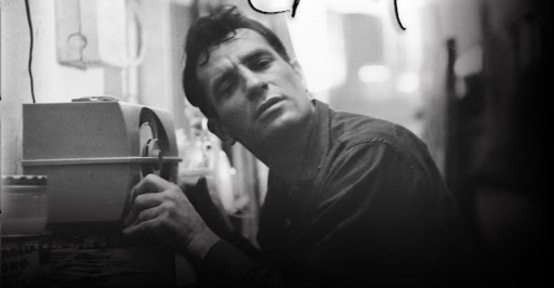On Kerouac and a few others – James Campbell in TLS:
‘The myth that Kerouac wrote On the Road in three weeks has proved persistent, but it was more like eight years, with many false starts and rewrites. A drawn-out process of further revision at Viking Press, overseen by Malcolm Cowley, was required to force it into what the editorial team regarded as publishable shape. Maher, who has enjoyed unparallelled access to the Kerouac archives in the Berg Collection at the New York Public Library and elsewhere, reveals that Cowley told a truculent Kerouac shortly before publication that he “didn’t know how to write”.’
(…)
‘The Kerouac we find here is unable to think about almost anything with clarity. When not riding high from the effects of “an experiment in complete artistic freedom” – raising his talent in his own regard to the level of James Joyce, William Faulkner or Arthur Rimbaud – Kerouac is cast down on account of the treatment he receives from others. It was not only enemy editors such as Cowley, but also his allies. In the autumn of 1952 he drove with Cassady to Mexico City to visit William Burroughs, then facing criminal charges after shooting his wife dead in a game of “William Tell”. (She had placed a glass on her head.) Clinging to the bloodied shreds of respectability, Burroughs refused to admit the pair of “mad ones” to the house, detesting Cassady and having previously hosted Kerouac. “I have never had a more inconsiderate and selfish guest under my roof.”’
(…)
‘The journals reveal that he regarded Burroughs’s neighbour, Paul Bowles, as “a pederast”, which Maher finds “crude”. It is, however, the information disclosed about Kerouac’s night-time habits that is likely to cause some fans to veer off the highway. After noting that Kerouac borrowed clothes from Burroughs “to visit an underaged Arab whore that he came to frequent in the coming weeks”, Maher elaborates:
He favored dark-haired, brown-eyed Moors trafficked in from Spain. He obtained them from a pimp named Paco who took him past various houses of prostitution clustered along the main street … The girls required no papers to be legally registered. All one had to do was declare that she wanted to do business. Age made no difference, as long as she was over fourteen. However, some were twelve years of age. They catered chiefly to tourists.
Kerouac soon wearied of the girls: “though he thought them cute and sweet, [he] felt them to be too jaded and impatient”. Anyway, funds were dwindling. “He would rather eat and drink than fuck.”’
(…)
‘But Kerouac always ended up back home, wherever home happened to be at the time, with the appalling Memère. She refused to allow Allen Ginsberg in the house because he was Jewish (a bias Kerouac was capable of emulating) and would supply her son with newspaper clippings of reports of crimes committed by Black people, adding her own nowadays unprintable comments.
Kerouac married three times. His first wife was Edie Parker, to whom he popped the question from a prison cell in 1944. He had been detained as a material witness to the killing of David Kammerer in New York by Lucien Carr, a close friend. After Carr stabbed Kammerer and rolled his body into the Hudson River near Riverside Drive, he and Kerouac spent the day together before being arrested. He was unable to meet the bail conditions, but Edie’s parents offered to do so if he married their daughter (strange, but true). The union lasted only a few weeks.’
(…)
‘Is this, then, the Beat Generation? Racism, mistreatment of women, drug degradation, holy banalities, untimely deaths? In addition to the killings of Kammerer and Joan Burroughs, a girlfriend of Cassady’s leapt from the roof of a building after he involved her in a scam.
Such a dismal summary would overlook the writing. Each of the principal figures wrote a work or works unlike any other of their time: Kerouac’s road books (he preferred his other Cassady novel, Visions of Cody); Ginsberg’s “Kaddish”, which makes “Howl” seem like a music-hall act; Burroughs’s early novels, including the totally improbable Naked Lunch. Gary Snyder’s backwoodsman poems are among the best writings of any Beat author (though he dislikes the label). And there is pleasure to be had in keeping company with the wide array of associates, from the one-time chicken farmer Robert Creeley to Philip Whalen, poet and head monk at the Hartford Street Zen Center in San Francisco. Lawrence Ferlinghetti established City Lights Bookstore in the same city in 1953 and started the distinctive Pocket Poets series. When its most successful product, Howl and other poems, was prosecuted, he went to court to defend it. Ferlinghetti took the view that the Beat Generation was a publicity stunt cooked up by Ginsberg.’
Read the review here.
We will bail you out if you marry our daughter, that’s a bit strange indeed.
What was wrong with the daughter?
2024 is the year in which I will read Naked lunch.
I’m not totally convinced that Kerouac could write, but he had an interesting life.
As to Bowles and other North-Africa travelers, the morals changed. Even in France nowadays. Pederasty is not acceptable anymore, not even if you are a self-proclaimed genius.
But there’s this suggestion, also in this review, that great works of art can lead to absolution. Great is not even necessary, just better than average.
